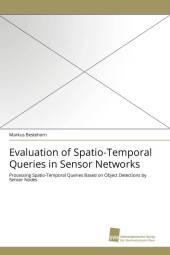 Neuerscheinungen 2011Stand: 2020-01-07 |
Schnellsuche
ISBN/Stichwort/Autor
|
Herderstraße 10
10625 Berlin
Tel.: 030 315 714 16
Fax 030 315 714 14
info@buchspektrum.de |

Markus Bestehorn
Evaluation of Spatio-Temporal Queries in Sensor Networks
Processing Spatio-Temporal Queries Based on Object Detections by Sensor Nodes
2011. 240 S. 220 mm
Verlag/Jahr: SÜDWESTDEUTSCHER VERLAG FÜR HOCHSCHULSCHRIFTEN 2011
ISBN: 3-8381-2514-2 (3838125142)
Neue ISBN: 978-3-8381-2514-5 (9783838125145)
Preis und Lieferzeit: Bitte klicken
Declarative query interfaces for Sensor Networks (SN)have become a commodity. These interfaces allowaccess to SN deployed for collecting data usingrelational queries. However, SN are not confined todata collection, but may track object movement, e.g.,wildlife observation or traffic monitoring. Whilerelational approaches are well suited for datacollection, research on Moving Object Databases (MOD)has shown that relational operators are unsuitable toexpress queries on object movement, i.e.,spatio-temporal semantics. The properties of SNprevent a straightforward application of MOD, e.g.,node failures, limited accuracy etc. Furthermore, MODmodel entities like regions as point sets whichpresumes very accurate knowledge on thespatial extend of these entities. Such knowledge isunavailable in most SN. Thisdissertation is the first to address spatio-temporalqueries in SN. It defines a complete set ofspatio-temporal operators for SN while taking intoaccount their properties and systematically shows howto derive query results from object detections.Finally, the dissertation presents a distributed,energy-efficient query processor for spatio-temporalqueries in SN. Declarative query interfaces for Sensor Networks (SN) have become a commodity. These interfaces allow access to SN deployed for collecting data using relational queries. However, SN are not confined to data collection, but may track object movement, e.g., wildlife observation or traffic monitoring. While relational approaches are well suited for data collection, research on Moving Object Databases (MOD) has shown that relational operators are unsuitable to express queries on object movement, i.e., spatio-temporal semantics. The properties of SN prevent a straightforward application of MOD, e.g., node failures, limited accuracy etc. Furthermore, MOD model entities like regions as point sets which presumes very accurate knowledge on the spatial extend of these entities. Such knowledge is unavailable in most SN. This dissertation is the first to address spatio-temporal queries in SN. It defines a complete set of spatio-temporal operators for SN while taking into account their properties and systematically shows how to derive query results from object detections. Finally, the dissertation presents a distributed, energy-efficient query processor for spatio-temporal queries in SN.
Markus Bestehorn studied computer science in Chemnitz andKarlsruhe. He received his computer science diploma in 2006 andjoined the Karlsruhe Institute of Technology (KIT) which awardedhim a doctoral degree in January 2011. He currently holds aSenior Researcher position at the Load Management department ofLandis+Gyr in Fehraltorf, Switzerland.


